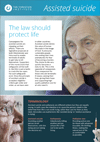Two Northern Ireland MLAs have spoken out against any weakening of the law on assisted suicide, saying it should be “strenuously opposed”.
Jeffrey Donaldson and Simon Hamilton made clear their opposition to any attempt to weaken the law on assisted suicide, which is currently illegal.
Last month the Director of Public Prosecutions for England and Wales, Keir Starmer QC, issued interim guidance outlining the public interest factors he will consider before deciding to pursue assisted suicide cases.
At the same time the Northern Ireland Director of Public Prosecutions launched a public consultation on the guidelines specific to the Province.
Mr Starmer’s guidance was brought about by the Law Lords’ ruling following the assisted suicide campaigner Debbie Purdy’s case.
Mr Hamilton, a DUP MLA for Strangford, said: “There are quite clearly a small minority of individuals in our country who are attempting to use the verdict in the Purdy case not just to clarify the criminal law surrounding prosecutions of those who help people to end their own lives, but to go much, much further and legalise assisted suicide.”
He continued by saying that he believed the “overwhelming majority” of people in the UK “value all life”.
He said: “Any such attempt to legalise assisted suicide and make distinctions about the value of one life compared to another would be morally repugnant.”
Mr Hamilton echoed the concerns of many who say any weakening of the law on assisted suicide would put the vulnerable at risk.
He said: “If assisted suicide were to be permitted under the law and those who helped in taking a life were immune from prosecution, how can we protect the elderly from malign influence or the depressed?”
Jeffery Donaldson, speaking before a debate on assisted suicide in the Northern Ireland Assembly, said: “It is appalling that there are those who advocate the view that some people would be ‘better off dead’. All human life is precious and any moves towards devaluing life should rightly be resisted.”
He continued: “Many vulnerable people may feel that because they perceive that their illness or old age makes them a burden for others that assisted suicide is an easy option.”
Mr Donaldson added: “The evidence from jurisdictions where assisted suicide is legal is frightening. In Holland, there were 546 deaths in 2005 as a result of lethal drugs not explicitly requested by the patient.”
He ended by saying: “There is also widespread medical opposition to assisted suicide. In a civilised, caring, compassionate and above all Christian society like ours, assisted suicide should be strenuously opposed and never ever considered as an option.”
The Director for Public Prosecutions in England and Wales is running a public consultation on his interim guidelines.
The consultation closes on 16 December.
Keir Starmer said in September at the release of the guidelines: “As this policy states, assessing the public interest is not simply a matter of adding up the number of factors on each side and seeing which side of the scales has the greater number.
“Each case must be considered on its own facts and its own merits.”
He added: “I also want to make it perfectly clear that this policy does not, in any way, permit euthanasia.
“The taking of life by another person is murder or manslaughter – which are among the most serious criminal offences.”
In September Jack Straw, the Justice Minister, expressed his opposition to any weakening of the assisted suicide law.
Commenting on the issue in an interview with The Daily Telegraph, Mr Straw said: “I’m not in favour of changing the law.
“That would give a green light to assisted suicide, and my worry has always been the potential for abuse.
“I’ve had some experience of loved ones in the terminal stages of illness. I don’t think you should give relatives that discretion.
“I just think it’s wrong to consider assisting someone in suicide. It’s not something I’m willing to contemplate.”

